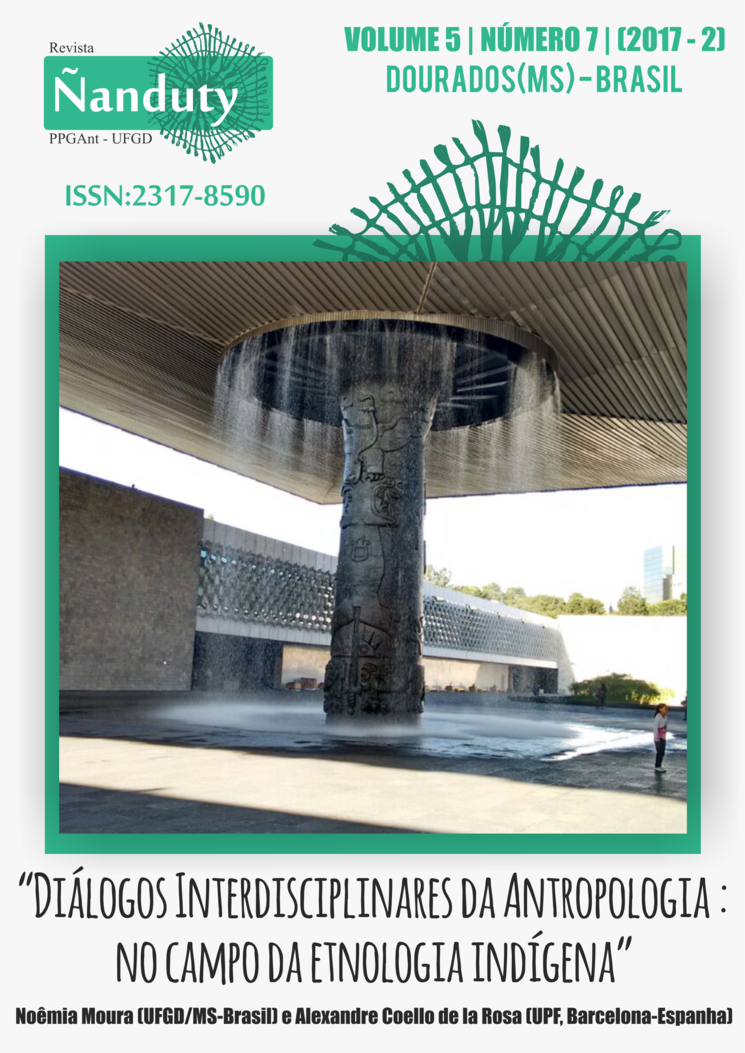Reflections on portuguese language teaching in an indigenous context
DOI:
https://doi.org/10.30612/nty.v5i7.7801Keywords:
Teaching. Portuguese language. Indigenous school.Abstract
This study aims to present the results of a research that aimed to diagnose, understand and reflect on the teaching of Portuguese in the bilingual context of an indigenous school of an Indian reservation in the region of Dourados/MS. It is known that the Referencial Curricular Nacional para as Escolas Indígenas/RCNEI, as well as other official documents about indigenous intercultural education, point to the guarantee of intercultural, bilingual and differentiated education for the indigenous population. Language is characterized as an object of power and identity of a people, however, in the indigenous context, the imposition of Portuguese as a second language is very present. This paper intends to present the reflections on teaching practices and conceptions of teaching and learning of Portuguese language present in the analyzed community. Thus, it is intended to highlight the concepts of language teaching underlying the choices and practices of teachers in the indigenous intercultural context of the region. Our theoretical perspective will focus on the reflections of Applied Linguistics and the research on indigenous school education and Portuguese language teaching as a second language.Downloads
References
ALMEIDA FILHO, José Carlos Paes de. (2013). Dimensões Comunicativas no Ensino de Línguas. Campinas, SP: Pontes.
AMARAL, Luiz. (2011). “Bilinguismo, aquisição, letramento e o ensino de múltiplas línguas em escolas indígenas no Brasil”. In: Cadernos de Educação Escolar Indígena – Faculdade Intercultural. JANUÁRIO, E. & SILVA, F. S. (Org.). Cáceres. UNEMAT, v. 9, n. 1.
ANTUNES, Irandé. (2003). Aula de Português: encontro e interação. São Paulo: Parábola Editorial.
BRASIL. Ministério da Educação (1996). Parâmetros curriculares nacionais: língua portuguesa / Secretaria de Educação Fundamental. – Brasília.
BRASIL. Ministério da Educação (1998). RCNEI - Referencial Curricular Nacional para as Escolas Indígenas. Brasília: MEC/SEF.
BRASIL. Câmara de Educação Básica (1999). RESOLUÇÃO CEB Nº 3, de 10 de Novembro de 1999.
BORGES, Agueda Aparecida da Cruz. (2013). “Língua Portuguesa para índios Munduruku: desafios e possibilidades de ensino”. In: D’ANGELIS, W. R. (Org.) Ensino de Português em comunidades indígenas: (1ª e 2ª língua). Campinas, SP: Curt Nimuendajú.
BRUNO, Lúcia. (2011). “Gestão da educação escolar indígena diferenciada: contradições, limites e possibilidades”. Revista Brasileira de Estudos Pedagógicos, Brasília, v. 92, n. 232, p. 639-662, set./dez.
CAVALCANTI, Marilda Cavalcanti. (2006).“Um olhar metateórico e metametodológico em pesquisa em linguística aplicada”. In: Por uma Lingüística Aplicada Indisciplinar. (Org.) Luiz Paulo da Moita Lopez. Parábola Editora.
D’ANGELIS, Wilmar. (2012). Aprisionando sonhos: a educação escolar indígena no Brasil. Campinas, SP: Curt Nimuendajú, p. 01-70.
D’ANGELIS, Wilmar. (Org.). (2013). Ensino de Português em comunidades indígenas: (1ª e 2ª língua). Campinas, SP: Curt Nimuendajú, 2013.
FAIRCLOUGH, Norman. (2008). Discurso e Mudança Social. Brasília. Editora Universidade de Brasília.
FERREIRA, Luisa Lucimar. (2013).“Produção de Jornal nas aulas de Português 2ª língua (Projeto Ibaorebu – Munduruku)”. In: D’ANGELIS, W. R. (Org.) Ensino de Português em comunidades indígenas: (1ª e 2ª língua). Campinas, SP: Curt Nimuendajú.
GERALDI, João Wanderley. (2002). “Prática da Leitura na Escola”. In: O texto na sala de aula. (Org.) João Wanderley Geraldi. Ática. HAMEL, R. E. (2013). “Relaciones entre lenguas y políticas linguísticas en la
globalización”. In: SBERRO, S.; HARPELLER, R. N. (eds). Lengua y Poder. Un régimen lingüístico para américa del norte. Thundes Bay: Lakehead University Centre for Northen Studies, p. 28-53.
KLEIMAN, Angela. (2002). Texto e Leitor: Aspectos Cognitivos da Leitura. Campinas, SP: Pontes.
MAHER. T. M. (1994). “O Ensino de Língua Portuguesa nas Escolas Indígenas”. Em Aberto, Brasília, ano 14, n.63, jul./set.
MAHER, T. M. (2010). “Políticas Linguísticas e Políticas de Identidade: currículo e representações de professores indígenas na Amazônia ocidental brasileira”. Currículo sem Fronteiras, v.10, n.1, pp. 33-48, Jan/Jun.
MELLO, L. e ROJAS, J. (2012). Educação, Pesquisa e Prática Docente em Diferentes Contextos. Campo Grande/MS, Life Editora.
MONSERRAT, R. M. F. (2006). “Planejamento Linguístico nas Sociedades Indígenas do Brasil Hoje: O Espaço e o Futuro das Línguas Indígenas”. In: GRUPIONI, D. B. (Org.). Formação de Professores Indígenas: repensando trajetórias. Brasília. MEC/Secretaria de Educação Continuada, Alfabetização e Diversidade.
PEREIRA, M. C. (2013). Desafios de Ensinar Português em Cenário Indígena – O caso de Mato Grosso do Sul. In: SILVA, Kleber Aparecido da/SANTOS, Danúsia Torres dos (Orgs). Português como Língua (Inter) Nacional: Faces e Interfaces. Campinas, SP: Pontes.
RAMOS, M. A. S. (2002). O Ensino de Língua Portuguesa na Escola Tengatuí Marangatu de Dourados. Monografia/UEMS.
SANTOS, L. A. (2005). “Considerações sobre o ensino de Português como segunda língua a partir da experiência com professores wajãpi”. Cadernos de Educação Escolar Indígena – 3º Grau indígena. Barra do Bugres: UNEMAT, v. 4, n. 1.
SWAIN, Merrill. (1986). “Bilinguismo sem lágrimas”. In: CUMMINS, J. e SWAIN, Merril Bilingualism in Education: aspects of theory, research and practice. Tradução: Wilmar R. D'angelis, 8 PP. Londres: Longman.
Downloads
Published
How to Cite
Issue
Section
License
Autores que publicam nesta revista concordam com os seguintes termos:
- Autores mantém os direitos autorais e concedem à revista o direito de primeira publicação, com o trabalho simultaneamente licenciado sob a Creative Commons Atribuição-NãoComercial-CompartilhaIgual 3.0 Brasil que permitindo o compartilhamento do trabalho com reconhecimento da autoria do trabalho e publicação inicial nesta revista.
- Autores têm autorização para assumir contratos adicionais separadamente, para distribuição não-exclusiva da versão do trabalho publicada nesta revista (ex.: publicar em repositório institucional ou como capítulo de livro), com reconhecimento de autoria e publicação inicial nesta revista.
- Autores têm permissão e são estimulados a publicar e distribuir seu trabalho online (ex.: em repositórios institucionais ou na sua página pessoal) a qualquer ponto antes ou durante o processo editorial, já que isso pode gerar alterações produtivas, bem como aumentar o impacto e a citação do trabalho publicado (Veja O Efeito do Acesso Livre).


